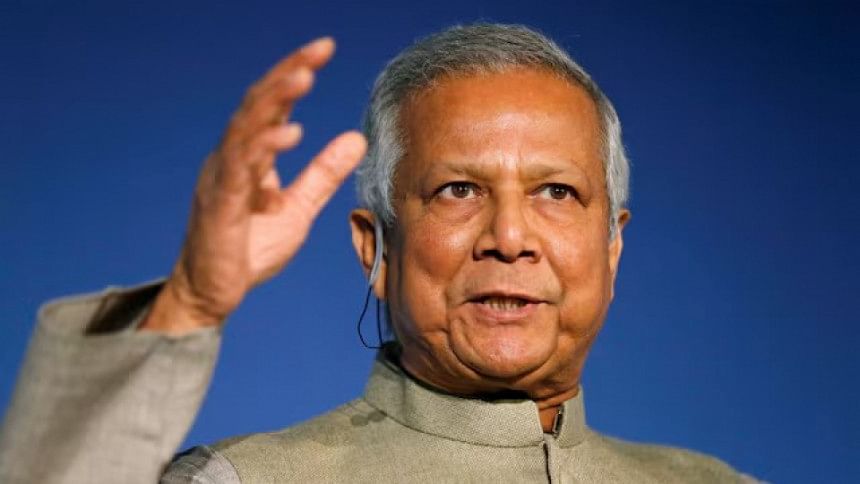World facing unprecedented challenges, yet opportunities beckon: Yunus at D-8

Chief Adviser Professor Muhammad Yunus today said that the the world is witnessing unprecedented challenges, yet, so many opportunities beckon us as well.
He made the comment during his address at the 11th Summit of the D-8 countries in Cairo, Egypt.
Prof Yunus said that the theme of the summit, focusing on youth and SMEs (small and midsize enterprises), aptly resonate with the shared aspirations of the nations participating.
Mentioning Bangladesh's median age of just 27 years, the chief adviser said that every year, around two and a half million young people enter the labour market.
"In a private sector driven economy, as we endeavour to get them fit for the market or, encourage them to emerge as agile entrepreneurs, we see how emergence of technologies is posing challenges and opportunities like never before," he said.
Prof Yunus pointed out the low skill level of millions of workers in the manufacturing landscape of the countries present at the summit, but said that the manufacturing and service economy of tomorrow is fast transforming, largely riding on artificial intelligence, machine learning, data-driven tools and applications.
"In Bangladesh, where agriculture is still a critical mainstay for the society and economy, we see how children of the majority of small farmers are little interested to puruse back-breaking, risky and often uncertain farming-on-field the ways their parents took upon as a a matter of tradition," he added.
The chief adviser of the interim government in Bangladesh referred to his travels of rural Bangladesh, and many parts of Asia, Africa and the Arab world, and said that he saw how millions of today's youth are fast embracing technology and innovation, in everything around – either to turn around long-persistent challenges or, eke out newer opportunities that many thought impossible even few years before.
Speaking of SMEs, Prof Yunus said that most of them thrive within informal economies. They aspire to grow and connect to global supply chain. Most often, they lack formal structure, access to institutional finance or support architecture and are unfamiliar with market norms-practices-standards.
"Yet, I see how amazingly capable and competitve the SMEs are. In the D-8 coutries, collectively we possess enough of wealth, even in private philanthropy, to stand by these scores of SMEs. With our modest support, we can shape a virtuous 'cycle of good', for them and for our people. We need to let money flow to them, through de-risking finance, for instance," he said.
He urged the D-8 government to convene candid, result-oriented conversation involving communities of youth – startups – business – finance, with the goal to carve out new platform amongst them.
He offered Bangladesh's leadership in taking such an initiative forward, hoping to convene a first multi-stakeholders meet in 2025.
He also urged the countries present to reinvent "learning" to make room for their young populations to become economy leaders.
He called on the countries to build on their heritage and take advantage of the digital revolution that has been with us for years, including using AI.
Prof Yunus proposed two specific actions for the world leaders' consideration.
Firstly, the chief adviser proposed building and deepening functional, impact-driven connections between universities and equivalent knowledge institutions, particularly focused on preparing boys and girls for entrepreneurship.
Secondly, he proposed thinking deeply about how to skill millions of young adults in workplace where right attitudes – values – ethics matter as much as hard skills, as well as confronting the challenge to re-skill millions at different vocational streams, on a continuous basis. He proposed thinking of a cooperative learning agenda that can complement the national undertakings of the D-8 countries.
He ended his speech by calling upon the D-8 leaders to look at their collective agenda afresh.

 For all latest news, follow The Daily Star's Google News channel.
For all latest news, follow The Daily Star's Google News channel. 



Comments